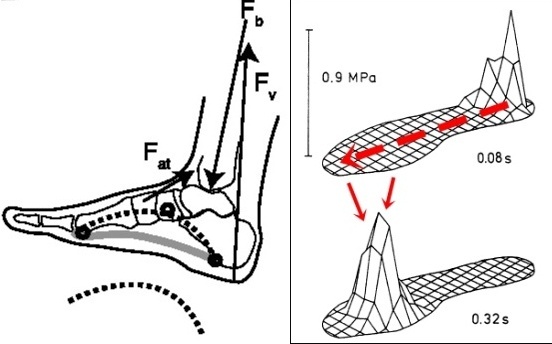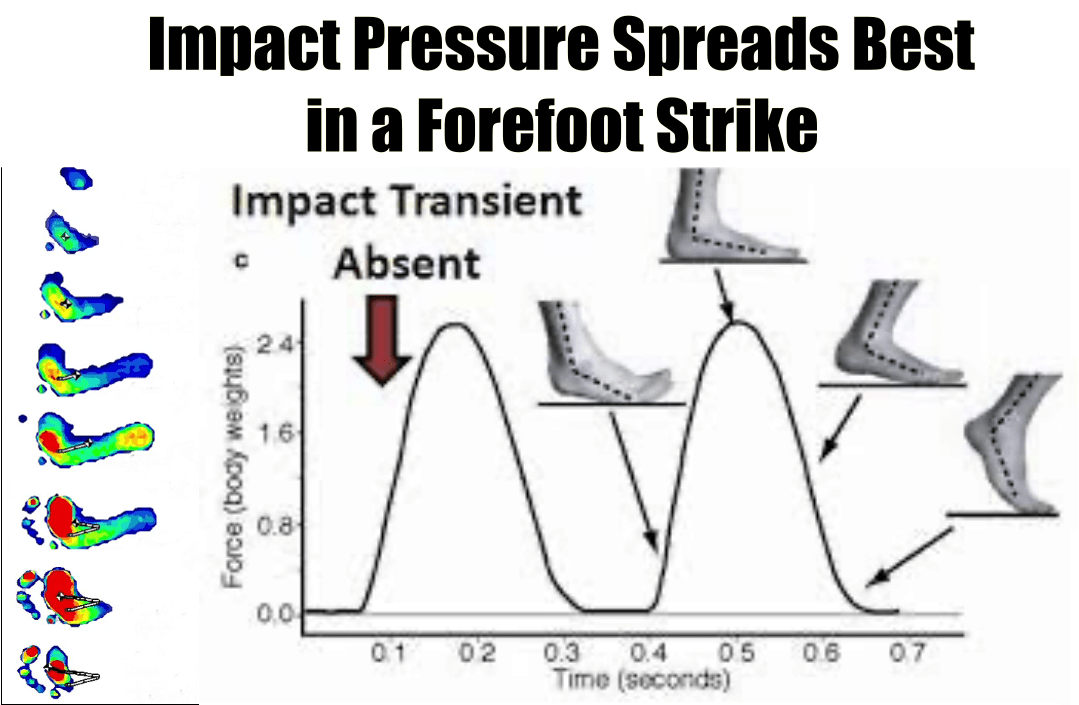One fact that doesn’t get enough attention is heel strike running causes foot overpronation, which is defined as excessive side-to-side motions of the heel during the stance phase of running. This type of movement of the foot can be a magnet for running injuries because the excessive twisting and bending at the foot is transferred across multiple sites up the leg, where Achilles pain, ankle sprains, shin splints and knee injuries are almost certain.
The reason heel strike running causes overpronation is because the distinct plantar (foot) loading pattern that’s produced when the foot rolls heel-to-toe is directly involved in pushing the foot into extreme positions which in turn was found to be directly involved in causing knee injury!


The excessive plantar loading forces the foot to pronate more which not only leads to misalignment of the foot and leg, but was also found to amplify shock, such as the ground reaction force, on the knee. This is why there’s countless links between heel strike running and chronic knee injury, but also Achilles injury, too:
- Earlier studies have linked the plantar loading pattern in heel strike running to Achilles injury whereby runners who had more earlier peak force in the lateral heel (i.e runners who had a pronounced heel strike) as well as a greater centre of force on the heel, affected Achilles tendon loading that contributed to injury.
Forefoot Running Keeps Pronations in a Safer Range!
The landing configuration of the foot in forefoot running makes it possible for more controlled pronation. Firstly, overpronation is minimized because landing with a forefoot strike automatically provides more surface to spread impact on. Essentially, there’s no point on the foot that gets a burst of heavy impact delivered to it which is why the amount of pronatory effort it takes to attenuate plantar loads is significantly reduced.
Secondly, forefoot running has the added benefit of less ground-contact time, resulting in a contact of the foot with the ground that’s so brief that certain impact variables and movement defections are not fully produced.
All in all, its the coupling of plantar pressure that’s more widely, evenly distributed and the feet spending more time in the air than on the ground that allows forefoot running to provide a more secure base from which overpronation can be prevented.
Most relevant, the forefoot strike is the normative foot strike in habitual barefoot runners and in shod runners who run barefoot for the first time, suggesting that the foot has an innate preference in transferring plantar loading more laterally, in a toe-to-heel direction, to prevent overloads on proximal structures, such as the knee and hip.
- In a forefoot strike, the lateral forefoot provides a larger surface area that’s packed with fat pads for sufficient amounts of plantar load dissipation and impact protection when running compared to the heel
All of this helps explain why heel strike runners suffering from knee and hip pain have full resolve of these ailments as soon as they switch to forefoot running.

The Take Home Message
The take home message is to keep people aware that foot strike pattern matters for so many reasons in running. The forefoot strike is the more practical and functional implementation of the foot when running because the direction of plantar loading distribution is a hugely important asset in protecting yourself from injury. Not just that, the forefoot strike is a proven, direct source of pronation control, an action aligned with reducing nearly every injury caused by heel strike running.

To that point, here’s a list of all the injuries caused by heel strike running that are prevented in forefoot running and why.
Reference:
Dowling et al. Dynamic foot function as a risk factor for lower limb overuse injury: a systematic review. J Foot & Ankle, 2014; 7:53
Van Ginckel A, Thijs Y, Hesar NG, Mahieu N, De Clercq D, Roosen P, Witvrouw E: Intrinsic gait-related risk factors for Achilles tendinopathy in novice runners: a prospective study. Gait Posture 2009, 29:387–391.

If you’d like, you can support Run Forefoot and help keep it going by making a donation in any amount of your choosing:

Or, you can support Run Forefoot by shopping at the BEST Barefoot Shoe Brands, and be sure to bookmark these links 🙂
Lonowear: https://lonowear.com/?ref=cedsholh
Saguaro: https://www.saguaro.com/?ref=9bVA8fEkmDvB-I
Vibram FiveFingers: https://www.anrdoezrs.net/click-7600968-11372648
Vivobarefoot: https://amzn.to/3vycQOY
Be Lenka: https://www.tkqlhce.com/click-7600968-13947200
Xero Shoes: https://xeroshoes.com/go/Run_Forefoot
Iguaneye: https://www.iguaneye.com/?ref=8tfXVc92
Soft Star Shoes: https://shrsl.com/3mp1b
Wilding Shoes: https://bit.ly/3lIygQP
Bretta Riches
BSc Neurobiology; MSc Biomechanics candidate, ultra minimalist runner & founder of RunForefoot. I was a heel striker, always injured. I was inspired by the great Tirunesh Dibaba to try forefoot running. Now, I'm injury free. This is why I launched Run Forefoot, to advocate the health & performance benefits of forefoot running and to raise awareness on the dangers of heel striking, because the world needs to know.
Latest posts by Bretta Riches (see all)
- Can You Run In Barefoot Shoes? Yes, But DON’T Heel Strike! - 21/07/2024
- Why Cushioned Running Shoes Are Really Bad for Your Feet - 19/07/2024
- Do Cushioned Running Shoes Cause Injuries? - 17/07/2024


